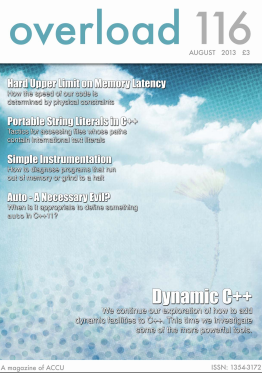C++ Conferences This Fall
I've created a short overview over the C++ Conferences this Fall:
- Going Native (Seattle, 4.th-6.9) SOLD OUT
- International Workshop on OpenMP (Canberra (AU), 16-18.9)
- (not a conference, but...) Fall ISO C++ meeting (Chicago, 23-28.9)
- QtDevDays Europe (Berlin, 7th - 9.10)
- QtDevDays US (San Francisco, 6th-8.11)
- Meeting C++ 2013 (Düsseldorf, 8th-9.11)
- C++ and Beyond (Snoqualmie Falls (WA/US), 9th-12.12) SOLD OUT
by Jens Weller

 I've been looking at the BlackBerry 10 NDK the last weeks, and did write about it to share some thoughts and results.
I've been looking at the BlackBerry 10 NDK the last weeks, and did write about it to share some thoughts and results. Danny Kalev wrote a nice article yesterday about a new C++ feature -- actually, two related C++14 features -- that were just added to the draft Standard in April and will be coming to real compilers in the near future.
Danny Kalev wrote a nice article yesterday about a new C++ feature -- actually, two related C++14 features -- that were just added to the draft Standard in April and will be coming to real compilers in the near future. A nice piece of writing on a C++11 feature:
A nice piece of writing on a C++11 feature: Today on Dr. Dobb's:
Today on Dr. Dobb's:
 Today in Dr. Dobb's:
Today in Dr. Dobb's: The solution to the latest GotW problem is now available:
The solution to the latest GotW problem is now available: